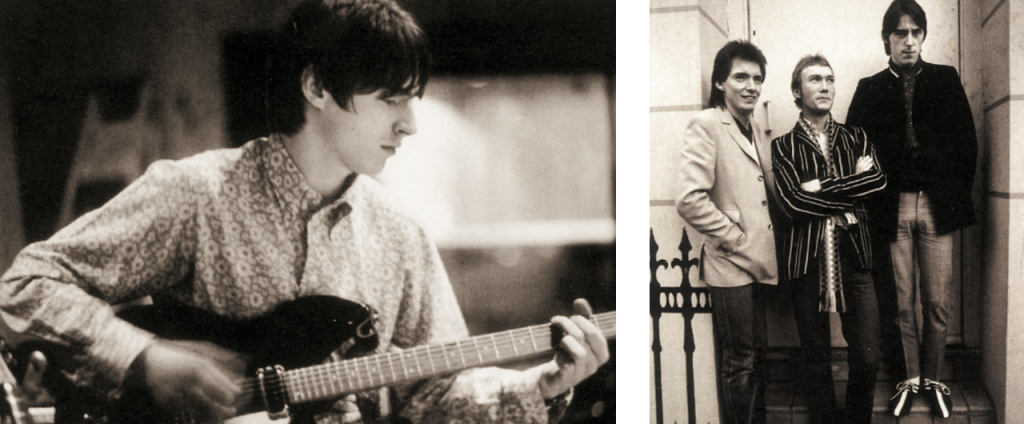
The woman answering the phone at the Four Seasons in Boston doesn’t pause or betray any interest when I ask for Paul Weller. There’s nary a hint of recognition or excitement as she connects me to his hotel room with a brusque “I’m transferring you now.”
As the call goes through, I’m feeling mildly shocked. This is, after all, the Paul Weller: leader of the Jam, Style Council and solo star. Major pop figure and heir to the uniquely British songwriting tradition of Messrs Townshend and Davies. Major influence on everyone from the Smiths to Oasis to Blur and a thousand others. Owner of nearly 60 top-40 hits and more than 25 top-40 albums … in Britain. Suddenly greeted by the man himself—prepping for one of the final shows of his recent U.S. tour—you wonder if it bothers him that the folks at the front desk in America have no idea who he is.
“‘Course not, man,” says Weller in his inimitably brisk Woking accent. “‘Cause the gigs here are still great. The connection ‘tween me and the audience is the same wherever I go. That’s the important thing.”
Still laddish at 45, Weller has been making an effort recently to elevate his profile in the U.S., where some of his albums (including 2000’s stellar Heliocentric) never saw an official release. Finally, in 2002, Columbia broke Weller’s American drought by putting out Days Of Speed, an acoustic live album. Last year, Yep Roc Records followed with the release of a new studio disc, Illumination, and a live DVD, Two Classic Performances.
Though Weller is accustomed to mainstream stardom in his homeland, in America, his status is closer to that of cult figure, which suits him just fine. “I’m always touched that there is an audience for me here,” he says. “More than what I ever realized.”
Still, Weller’s draw in the States has been a bit schizophrenic. His two solo tours since 2001 have been greeted with multiple-night sellouts in some cities, but sporadic cancellations in others. At this point, Weller concedes his aims for the U.S. are modest. “If I could get enough of an audience to come play over here regularly and not lose a fortune,” he says, “I’d be quite happy, really.”
Diehard fans have yet another opportunity to put a bit more Weller in their record collections, as he lends his name and tastes to a volume of DMC Records’ Under The Influence series, following on the heels of similar sets compiled by Morrissey and the Stone Roses’ Ian Brown. “It’s tough, ‘cause if you come up with 10 songs, you can think of 20 or 30 to include,” says Weller. “So I just sat down one night, got stoned and drunk and went about it as if I was just making a tape for someone. Did it in that spirit.”

While Morrissey’s choices—Nico, New York Dolls, Patti Smith—were fairly predictable, Weller’s set is light on the expected mod faves, focusing instead on a wide berth of music from obscure soul (Winstons, Five Stairsteps) to progressive jazz (Charles Mingus, John Coltrane) to reggae (Wailers, Big Youth), as well as newer tracks from D’Angelo and the Blind Boys Of Alabama. “I listen to so many different types of music, regardless of whether it’s new or old,” says Weller. “I suppose as I’ve gotten older, my tastes are probably more open. If it’s good, it’s good. I was much more narrow-minded when I was younger.”
In what’s apparently becoming a minor quest to turn others on to his favorite tunes, Weller has been working in Holland with longtime collaborator Steve White and a crew of local musicians to complete Forty Days And Forty Nights, an album of cover songs set for a spring release. Skewed toward ‘70s funk and soul (Rose Royce’s “Wishing On A Star,” Sister Sledge’s “Thinking Of You,” Gil Scott-Heron’s “Bottle”), the LP will also include the odd folk curio (like Tim Hardin’s “Don’t Make Promises”).
Along with the recent Fly On The Wall (Independiete)—a double-disc odds-and-sods collection gathering b-sides, live tracks and compilation cuts from the ‘90s— the projects have allowed Weller to pause from writing new material, something he’s been doing furiously for the past few years. “Probably the last 25 years, actually,” he jokes. “Regardless of what people think in the U.S., I’ve never really stopped. I’ve either been on tour, making a record or trying to write a record. I don’t feel burned out, but I’ve needed a break from the process of writing. It’s odd, ‘cause since I’ve been ignoring it, I’ve found myself writing new stuff anyway.”
Forty Days And Forty Nights will be the first album as part of a new multi-record deal with V2, which no doubt hopes Weller will continue the success he’s enjoyed since a post-Britpop resurgence that began with 1993’s Wild Wood. But even though Illumination debuted at the top of the U.K. charts, he remains cautious. “It was number one, but in the [record label’s] eyes, unless you’re selling 1.6 million these days, it’s a fucking failure,” he says. “It didn’t matter that it was number one; it didn’t sell fantastically. It’s just not good enough for these labels now, what with the whole corporate mentality. You walk into a record company, and most people are shitting themselves whether they’re going to lose their jobs.”
One surefire moneymaker for Weller’s old bosses at Universal has been the Jam, whose output has consistently been repackaged and resold with great success. A particularly notable addition to the band’s catalog was last year’s exhaustive DVD collection, The Complete Jam, which emptied the archives of rarely seen video, television and archival footage. Weller has long maintained an uneasy relationship with his old group. Finally, some 20 years after he broke up the band, he’s including Jam songs in his live sets.
“It started with the first solo tour I did in 2001,” says Weller. “I guess I was always conscious of not trading on past glories, but I feel vindicated because I made it back to some degree on my own steam. So now I can see all my songs as one body of work rather than putting them into little compartments. Honestly, I don’t sit around playing my records at home all day long. But if I’m putting a set together, I might listen back to some old records—with the Jam, but especially so with the Style Council—to see what songs I can do.”
Ah, yes, Weller’s “other” band, the Style Council: the politically potent, slick-soul collective he led for nearly a decade with keyboardist Mick Talbot. Though major stars in Europe during their first three years, their popularity waned as Weller confused audiences (and his label) with jazz, house and even rap experiments. But thanks to a 1998 boxed set, an insightful two-hour BBC radio documentary and, most of all, the passage of time, an inevitable reappraisal of the Style Council has helped restore its much-maligned reputation.
“I’m glad people are giving the band another listen, ‘cause we got a pretty hard time in the U.K.—from the press, especially,” says Weller. “Some people couldn’t forgive me for breaking up the Jam, and some people simply couldn’t reconcile the two musics. I know it’s all down to personal taste, but there were some good songs in the Style Council. And that’s the thing. Whether it’s the Council or the Jam, the solo stuff or even the covers, my feeling is that you can’t keep a good song down.”
—Bob Mehr






